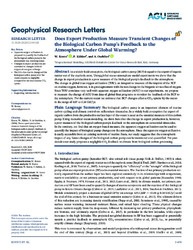Does Export Production Measure Transient Changes of the Biological Carbon Pump's Feedback to the Atmosphere Under Global Warming?
Koeve, W.; Kähler, P.; Oschlies, A., 2020: Does Export Production Measure Transient Changes of the Biological Carbon Pump's Feedback to the Atmosphere Under Global Warming?. In: Geophysical Research Letters, Band 47, 22, DOI: 10.23689/fidgeo-4122.
 |
Dokument öffnen: |
In a widely‐held conception, the biological carbon pump (BCP) is equal to the export of organic matter out of the euphotic zone. Using global ocean‐atmosphere model experiments we show that the change in export production is a poor measure of the biological pump's feedback to the atmosphere. The change in global true oxygen utilization (TOU), an integrative measure of the imprint of the BCP on marine oxygen, however, is in good agreement with the net change in the biogenic air‐sea flux of oxygen. Since TOU correlates very well with apparent oxygen utilization (AOU) in our experiments, we propose to measure the change of AOU from data of global float programs to monitor the feedback of the BCP to the atmosphere. For the current ocean we estimate that BCP changes effect a CO2 uptake by the ocean in the range of 0.07 to 0.14 GtC/yr. Plain Language Summary:
The biological carbon pump is an important element of marine carbon cycling and climate control on millennium timescales. In a widely‐held conception the export of organic carbon from the productive surface layer of the ocean is used as the essential measure of this carbon pump. Using numerical ocean modeling, we show here that the change in export production is, however, a poor measure of the biological carbon pump's feedback to the atmosphere on centennial timescales. In the contrary, we find that an oxygen‐based measure, the apparent oxygen utilization can be used to quantify the impact of biological pump changes on the atmosphere. Since the apparent oxygen utilization is easily accessible from an existing network of marine floats, our study suggests that the atmospheric impact of any future changes of the biological carbon pump can be monitored and quantified. For past decades our study proposes a negligible CO2 feedback to climate from biological carbon processing. Key Points:
Apparent oxygen utilization is proposed to quantify the feedback of the biological carbon pump to the atmosphere in a warming ocean.
Changes in export production are unrelated to changes in biotic oxygen air‐sea gas exchange.
The CO2‐flux due to changes of the biological carbon pump over the recent decades is negligible compared to the total marine CO2 uptake.
Statistik:
ZugriffsstatistikSammlung:
This is an open access article under the terms of the Creative Commons Attribution License, which permits use, distribution and reproduction in any medium, provided the original work is properly cited.

